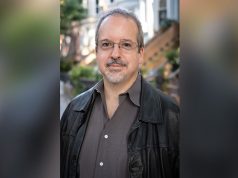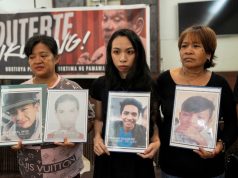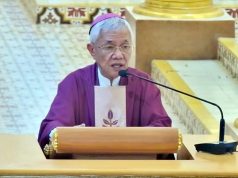“Wag kang lalabas. May binabaril pa.”
—
This is part of a series of stories on some — in truth, but a handful — of the families left behind by the thousands of victims of the extrajudicial killings that have marked the war on drugs waged by the government, which also turned one year old with the presidency of Rodrigo Duterte.
At twenty-five years old, Edna* cries like a child. She hiccups, sniffs, and snorts. Her nose is red. Offered a roll of tissue, she takes it and wipes the tears that well in her eyes. They don’t stop coming.
Nevertheless, she has made up her mind to tell her family’s story, and needs no prompting.
Edna recalls how her husband Fred*, 27, was killed a few hours after midnight on February 15, just outside their neighbor’s house in Brgy. Payatas, Quezon City.
“Una po kasi nagising kami kasi may maiingay na lasing sa labas… Tapos lumabas po ‘yung asawa ko para po umihi, kasi wala po kaming CR sa loob ng bahay. Nung medyo pabalik na po siya, siguro po tapos na umihi, bigla na lang po akong nakarinig ng malakas na putok. Tapos po may nagsabing, ‘Ah!’ (At first, we were awakened by some noisy drunkards outside… Then my husband went out to pee, because we have no CR inside the house. When he was on his way home, perhaps he was already done urinating, I suddenly heard a loud bang. Then someone cried, ‘Ah!’),” Edna says.
She automatically thought that someone had been shot. She crept outside their door and saw a white van parked in front of the nearby alley. The gunshots continued to ring. She headed back inside to find their five-year-old daughter prying their window open.
Immediately she whisked her to the space under their bed, where they took cover. Edna was afraid her daughter might get shot too, mistaken for someone else.
“Wala pa ring habas ‘yung pagpapaputok, halos ubusin po ‘yung bala (The gunshots kept coming; they were trying to finish all the bullets),”Edna says.
After the shooting died down, she left her daughter under the bed and went outside.
It was then that she found Fred sprawled on the ground, his clothes drenched in blood.
“Pagkakita ko po sa kanya, wala na po akong ibang narinig. Hindi ko po alam, may binabaril pa po pala sa ‘di kalayuan (When I saw him, I didn’t hear anything else. I didn’t know that they were shooting someone else nearby),” Edna says.
“Ang pumasok na lang po sa isip ko, ayokong makita ng anak ko na ganun ‘yung itsura ng papa niya, kaya ang ginawa ko po, kinuha ko po ulit ‘yung anak ko, lumabas po ako, kumatok ako sa kaharap naming bahay, sa mama ko po, pinasok ko po siya doon. Doon ko na lang po nalaman na may binabaril pa pala. Kasi hindi ko na po talaga naririnig ‘yun eh. ‘Yung kapatid ko na lang po at saka ‘yung mama ko ang nagsabi, ‘Wag kang lalabas, may binabaril pa sa labas’ (All I could think of was I didn’t want my daughter to see her father like that. So what I did was to pick up my daughter from inside our house, go out, and knock on the door of the house across from ours, my mother’s. I took her there. It was there that I found out that someone else was being shot, because I wasn’t hearing anything else. My sibling and my mother just told me, ‘Don’t go out, they’re still shooting someone out there’),” Edna says.
Aside from Fred, the killers murdered another man who was known for buying spoons from the trucks that would dump the trash nearby.
No drugs found
The barangay officials, police, and Scene of the Crime Operatives arrived. According to Edna, they didn’t find any drugs on Fred’s person. He had been wearing a jacket, and all his pockets were turned inside out. All they found was some money. A store owner said that Fred had bought some coffee before returning home.
Edna has no idea why her husband was killed.
“Kasi wala pong kaaway ‘yung asawa ko. Bungisngis po ‘yun eh. Palabiro. Lahat po ng makakakilala doon binabati niya (My husband has no enemies. He is quick to laugh. He cracks jokes. He greets everyone he knows),” she says.
He worked on the dump trucks, and drove a sidecar for hire. It was hard for him to find a decent job, because he didn’t finish high school, Edna says.
As for her, she used to work at a gas station, on the night shift. Because of the hours, she can’t say for sure that her husband was not involved in drugs.
They loved to dance together. It was the family’s favorite pastime.
“Nag-be-breakdance ‘yun. Bumebertikal (He used to breakdance. He could go vertical),” Edna recalls. She herself used to do hiphop, jazz, ballroom, and even ethnic dance.
Mother and daughter would also join zumba classes held at the barangay hall before. Not anymore.
The pair now lives with Edna’s parents. She has a job at a catering company, but can’t always make it to work.
“Kasi ‘yung anak ko po, nagka-phobia po talaga ‘yun… Hanggang ngayon po takot siya. Ayaw niya pong nahihiwalay ako sa kanya, kaya kapag pumapasok po sa eskwelahan, hindi po siya papasok hangga’t wala po ako sa room. Kailangan kasama niya po ako. Matatakasan ko lang po siya kapag medyo nalilibang na siya sa turo ng titser (My daughter really had a phobia. Until now she’s afraid. She doesn’t like it when we’re apart, so when there’s school, she won’t enter the classroom unless I’m there, too. I have to be there. I can only sneak away when she gets enthralled with the teacher),” Edna says.
Traumatized child
During Fred’s five-day wake, their daughter didn’t go out of the house once. How could she feel safe when her father was killed right next door?
“Dapat po bibigyan ako ng trabaho dito sa simbahan, tinulungan po nila ako magkatrabaho, hindi ko lang po maasikaso kasi po ‘yung anak ko, ayaw niya talagang mahiwalay sa akin (The people at church are helping me find a job. They were supposed to give me a job but I can’t do it because my daughter really doesn’t want to be away from me),” Edna says. Her hiccups are louder, her tears fall faster.
“Kung ako lang po, madali lang po. Kaya ko po ‘yung sarili ko eh. Pero ‘yung makita ko ‘yung anak ko, nahihirapan po ako. Ayoko namang iasa lahat sa magulang ko, eh. Kaya lang po, wala po akong magawa. Kailangan po ‘yung anak ko ‘yung tutukan ko (If it was just me, it would be easy. I can make it on my own. But seeing what it does to my daughter is hard. I don’t want to depend on my parents, but I can’t do anything about it. I have to focus on my child),” Edna says.
Her daughter has changed drastically, she adds. The five-year-old no longer listens to her, and has to be next to her at all times. Edna can hardly do anything.
The church has been helping them process what happened and move on. It has given Edna’s daughter school supplies and shoes, but what she really needs is a source of livelihood.
Their neighbors, knowing their situation, also pitch in.
Edna’s mother works at the barangay office for P5,000 a month, and her father is now retired from being a security guard due to his age. With his savings, the family sells drinks and kwek-kwek (egg fritters).
Asked for her thoughts on the first year of President Rodrigo Duterte in office, Edna says, “Sa totoo lang po, takot po akong magsalita. Mahirap na rin po kasi parang lahat na lang po ng kaso ginagawa nila, buhay na lang ang kapalit. Pero po sana kung may ibang paraan sila, sana ‘yun na lang ang ginawa nila. Kung may kaso man po sa paggamit ng droga, pagbebenta ng droga, sana po inimbestigahan na lang, kinulong na lang po nila. At least po makikita ng pamilya, buhay ‘yung taong ‘yun (To be honest, I’m afraid to speak. It’s hard because it seems like they take away a life for every case they handle. But if they have another option, I wish they’d do that instead. If someone did use drugs or sell drugs, I wish they would just investigate and send the person to jail. At least the family would see him, he would still be alive).”
A person can atone for his sins while in prison, Edna argues. Everyone can change.
“Kasi po hindi rin natin alam kung ano ‘yung dahilan nila, bakit nila napapasok ‘yung ganung sistema na sinasabi nila. Kasi marami nga pong walang pinag-aralan ngayon, kumakapit po sa patalim, siyempre po sa droga raw po mabilis ang pera. Siyempre po ‘yung dahilan ng tao na ‘yun sa pagbebenta nila, hindi po natin alam kung maganda ba, kung para sa pamilya. Siyempre para may ipakain sa pamilya (We don’t know what their reasons are for getting involved in that system. Because there are many people who are uneducated and resort to such means. They say money comes easy through drugs. Of course, we don’t know whether they have good reasons for selling drugs, maybe it’s for their family),” Edna says.
The best way to end the proliferation of drugs, she stresses, is to provide jobs for everyone.
“Para doon sa mga taong walang pinag-aralan, para hindi nila napapasok ‘yung ganung klase ng trabaho (So that the people who didn’t finish their studies won’t have to do that kind of work),” she says.
*Names have been changed to protect the people’s identity.










